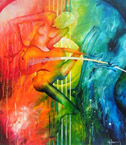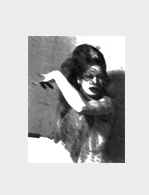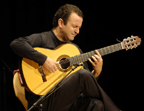Welcome to one of the most active flamenco sites on the Internet. Guests can read most posts but if you want to participate click here to register.
This site is dedicated to the memory of Paco de Lucía, Ron Mitchell, Guy Williams, Linda Elvira, Philip John Lee, Craig Eros, Ben Woods, David Serva and Tom Blackshear who went ahead of us.
We receive 12,200 visitors a month from 200 countries and 1.7 million page impressions a year. To advertise on this site please contact us.
|

|
|
buleria speed
|
You are logged in as Guest
|
|
Users viewing this topic: none
|
|
Login  | |
|

   
xirdneH_imiJ
Posts: 1892
Joined: Dec. 2 2006
From: Budapest, now in Southampton

|
 RE: buleria speed (in reply to rickm) RE: buleria speed (in reply to rickm)
|
|
|
220 is pretty standard, it's not that fast...
subidas tend to go much faster than that, and decent dancer should be able to handle this speed...of course, some prefer slower, but that's more like a jaleo style beat we play then...
so the answer is yes, practice it at that speed too, and even faster...generally the higher the speed is, the less ornamentation you'll be able to add, so concentrate on rhythm, make little stops, string dampenings, etc, to make it sound alive and not just a repeating pattern...
|
|
|
|
REPORT THIS POST AS INAPPROPRIATE |
Date Feb. 12 2013 15:00:24
 |
|

   
Erik van Goch
Posts: 1787
Joined: Jul. 17 2012
From: Netherlands

|
 RE: buleria speed (in reply to Flamencito) RE: buleria speed (in reply to Flamencito)
|
|
|
quote:
ORIGINAL: Flamencito
my idea (or more the idea of my teacher) is that it is neccesary to practise new things really slow first. In this way your brain can remember the proper movements, since you have time to concentrate on doing it with the right technique.
Although it's tempting to play on regular speed for me as well, i don't know if it's a good idea for the process.. any Idea on this from the ones who teach?
You're teacher is 100% right. In fact it is a 2 directional way. When you learn new things it is the brain that has all the info, or at least has a clear (or lesser clear) concept of what is going on and were to strive at. So constant awareness of the brain is needed to guide, monitor and evaluate your (intended) new actions. At any given moment your brain has to handle many different impulses (in both in-and out coming direction) and in that wire of information it has to encourage/preserve what is good and prevent/reject what is bad.
On top your fingers need a little time to develop muscle memory. If you let them just foul around they develop a muscle memory for just fooling around. So BEFORE it comes to muscle memory you must make sure they imprint the right memory by mentally demanding 100% correct behavior. But when your fingers do something that outclasses your brain, the brain has to be alert as well to detect and exploit it, demanding at least equal results on the next try (based on that new and improved view of were to strive at). Only when brain and fingers come to a mutual agreement about the best approach you can start drilling, repeating the correct moves over and over again to get it in your system (both brain and muscle memory)....still slowly slowly slowly.
My golden rules:
* Slowly slowly slowly (gives you more time to generate/monitor/correct/evaluate both in and output).
* The smaller the object of your focus the bigger the results (with numerous applications mentioned in older and future posts).
* Only repeat what is worth repeating (and don't repeat what is not worth repeating)...this means 2 things:
......1: don't waste time on parts of the falseta/compas-variation you can play already to your likings
......2: focus on the parts that don't go to your likings.....this means 2 things:
..........1: don't allow mindless repeating hoping the problem solves itself....all you do is repeating the same mistake over and over again PERFECTLY practicing/imprinting making that mistake.
..........2: give it some thought first.... what goes wrong and why. Then find the solution and only then study/drill that solution in full focus.
and for the more/extremely advanced:
* as soon as you manage to produce the perfect hit "a couple of times on a row" in full awareness and know how it feels (your brain and all other senses were there weren't they, studying slowly so you had all the time to absorb what was going on?)....so once you know how it feels putt down your guitar and do it in your mind only, visualizing all the ingredients (finger movement, moment of making contact, energy exchange, string-vibration, finger relaxation, sound....i told you you need time to evaluate did i?)..... Going up and down between actual playing (checking/rechecking) and playing by mental visualization(training the underlaying and leading hand-nerve map in your brain) helps you to control your system more quickly and at the end allows you to play complete pieces "in your head only" as real as real can get (up to a point were it might be even better to practice without a guitar).
Any interruption like trying to play to fast to soon disturbs the process....you need focus and absolute control..... as you see slowly slowly slowly is only a "mild demand" :-)
i only mentioned the more experienced/extremely advanced part because you asked tricks to study/develop without holding a guitar in another post. I mentally played the guitar as real as real can get in busses, trains, my bed.... you name it.
I run into this old post. My second respond give more details of how i study. In fact until my thoughts and moves are 100% ok i don't bother about playing in rhythm at all (remember * 2 above!!!!!!). By eliminating the necessity to be/leave somewhere "in time" i can fully concentrate on the correct movement and the equally or even more important muscle relaxation. As soon as that is covered i make sure i do it at the right moment as well but it's more easy to shorten a gab then to alter a misprinted move.
http://www.foroflamenco.com/tm.asp?m=210920&mpage=1&p=&tmode=1&smode=1&key=
|
|
|
|
REPORT THIS POST AS INAPPROPRIATE |
Date Mar. 9 2013 7:32:58
 |
|

   
Ricardo
Posts: 14822
Joined: Dec. 14 2004
From: Washington DC

|
 RE: buleria speed (in reply to rogeliocan) RE: buleria speed (in reply to rogeliocan)
|
|
|
quote:
ORIGINAL: rogeliocan
Great answer Erik.
quote:
I mean Im guessing most folks do for simple pracitce, but a dancer would swear at you im thinking.
Good dancers might but students dancers would not at all. The dancers have to learn to dance just like we do, slow first. So unless they are quite advanced, they wouldn't even be able to keep up with you.... they need to think about their footwork and they need to count....
And in the end, you play for yourself first, nothing stops you from playing anything at any speed, as long as you enjoy it. Even if you play for others, here, nobody knows about flamenco so they don't know and they appreciate any music at any speed. And I think it's better to play slow well than fast with errors, messy strumming and broken rhythm.
i agree slow is important for guitarists. Dancers might work out a technique slow of course, but a choreography usually medium speed. As far as bulerias, well it is supposed to be improvised, so there are different schools of thought I think. Point is a student might have worked out footwork and choreography as "bulerias" but encounter a juerga and are at a loss as how to move in and out of the thing...so in a sense there has to be some understanding about jumping in and going for it, at least with dance.
_____________________________
CD's and transcriptions available here:
www.ricardomarlow.com
|
|
|
|
REPORT THIS POST AS INAPPROPRIATE |
Date Mar. 10 2013 0:26:16
 |
|
 New Messages New Messages |
 No New Messages No New Messages |
 Hot Topic w/ New Messages Hot Topic w/ New Messages |
 Hot Topic w/o New Messages Hot Topic w/o New Messages |
 Locked w/ New Messages Locked w/ New Messages |
 Locked w/o New Messages Locked w/o New Messages |
|
 Post New Thread
Post New Thread
 Reply to Message
Reply to Message
 Post New Poll
Post New Poll
 Submit Vote
Submit Vote
 Delete My Own Post
Delete My Own Post
 Delete My Own Thread
Delete My Own Thread
 Rate Posts
Rate Posts
|
|
|
Forum Software powered by ASP Playground Advanced Edition 2.0.5
Copyright © 2000 - 2003 ASPPlayground.NET |
6.188965E-02 secs.
|


 Printable Version
Printable Version










 New Messages
New Messages No New Messages
No New Messages Hot Topic w/ New Messages
Hot Topic w/ New Messages Hot Topic w/o New Messages
Hot Topic w/o New Messages Locked w/ New Messages
Locked w/ New Messages Locked w/o New Messages
Locked w/o New Messages Post New Thread
Post New Thread